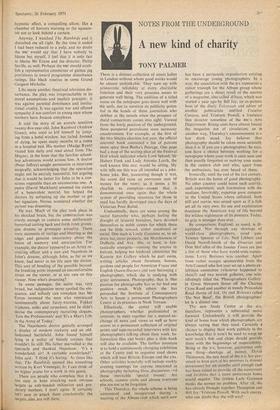TELEVISION
Disturbances
Patrick Skene CATLING
`Some viewers,' an announcer warned us before The Rainhirds, Clive Exton's 'Play for Today' (nee 1), `may find certain scenes dis- turbing.' I wonder whether a warning like that causes a sudden surge of superabundant power on the national grid, as millions of timid viewers switch off their sets and turn to the cosy thrills of traditional detective novels, or whether the warning has a generally
hypnotic effect, a compelling allure, like a chamber of horrors warning to the squeam- ish not to look behind a curtain.
Anyway, I watched The Rainbirds and it disturbed me all right. By the time it ended I had been reduced to a pulp, and no doubt the BBC would say that I have nobody to blame but myself. I feel that it is only fair to blame Mr Exton and the director, Philip Saville, as well. Perhaps the Bac should estab- lish a representative committee of guinea pig previewers to award programme disturbance ratings, like black rosettes in some Grand Guignol Michelin.
Like many another theatrical television dis- turbance, the play was irreproachable in its moral assumptions and implicit precepts: it was against parental dominance and institu- tional cruelty. It was against war and offered sympathy if not comfort to young men whose mothers have Jocasta complexes.
It told the story of an acutely sensitive twenty-five-year-old, John Rainbird (Andrew Grant), who tried to kill himself by jump- ing from a hotel window, but failed. Instead of dying, he spent many months in a coma in a hospital bed. His mother (Madge Ryan) visited him daily and read aloud from The Magnet, in the hope that the familiar school- boy adventures would arouse him. A doctor (Peter Jeffrey) sought permission to intervene surgically, acknowledging that the operation might not be entirely successful, but arguing that it would be better for John to be a con- scious vegetable than an unconscious one. A padre (David Markham) assumed the stance of a benevolent neutral, but helped the doctors by softening up the mother to get her signature. Nurses wondered whether the patient was dreaming.
He was. Much of the play took place in his shocked brain, but the construction was sturdy enough to contain some deliberately hysterical cutting back and forth from grotes- que dreams to grotesque actuality. There were moments of vertigo and blurring at the edges and genuine uncertainty about the limits of memory and anticipation. For example, the doctor' appeared as an Army re- cruiting officer and a nun and Napoleon in John's dreams, although John, as far as we know, had never in his life seen the doctor. This sort of bending of the possible beyond the breaking point imposed an uncomfortable strain on the viewer, or at any rate on this viewer. Now who's dreaming?
In some passages, the satire was very broad, but indignation never spoiled the elo- quence, and nobody can complain that Mr Exton invented the men' who reminisced sentimentally about fuzzy-wuzzies, Fokker triplanes, tanks and torpedoes; and he didn't devise the contemporary recruiting slogans, 'Join the Professionals' and 'It's a Man's Life in the Army of Today.'
The Napoleonic doctor genially arranged a display of modern rocketry and an old- fashioned battlefield. John found himself lying in a' welter of bloody corpses that wouldn't lie still. His father marvelled at the spectacle and thanked Napoleon: 'Ws a wonderland, sir! A veritable wonderland!' John said: 'I think it's boring.' At times like that, The Rainbirds seemed like something written by, Kurt Vonnegut, Jr. I can think of no higher praise for a work in this genre.
There are people who complain that it is too easy to keep attacking such obvious targets as soft-headed militarists and pre- datory mothers. I don't agree. It certainly isn't easy to attack them conclusively; the targets, alas, are still there.



































 Previous page
Previous page